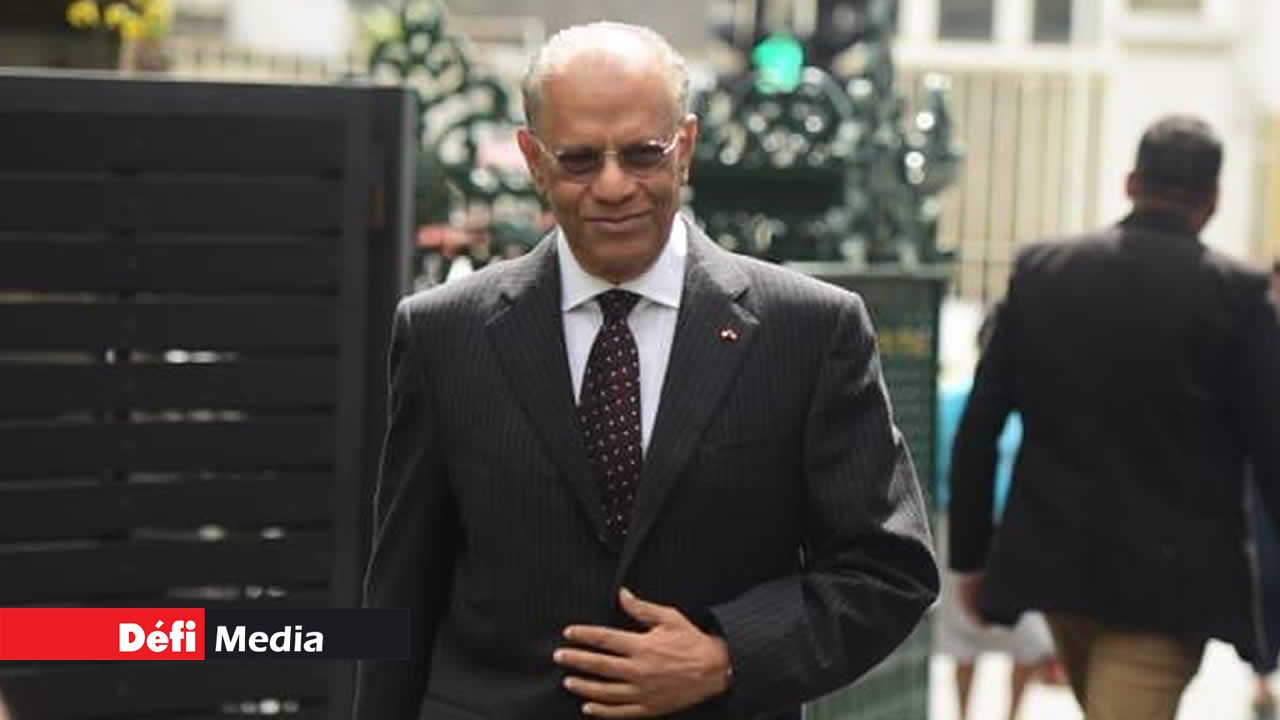
Réduire de 25 % le prix des carburants, celui du gaz ménager ainsi que les tarifs d’électricité. C’est ce que demande Navin Ramgoolam au gouvernement dans une lettre ouverte qu’il a publiée sur sa page Facebook, ce mercredi 8 avril.
Publicité
Le leader du Parti Travailliste (PTr) a formulé une quinzaine de propositions, visant à préserver les emplois, les salaires, le pouvoir d'achat et les prestations sociales.
Navin Ramgoolam est d’avis que l’aide financière destinée au secteur informel doit être alignée sur le salaire minimum. Il demande également à la Mauritius Revenue Authority de suspendre les paiements de la National Pension Fund et du National Pension Scheme.
Pour la classe moyenne, le leader des rouges pense que le gouvernement devrait demander aux banques commerciales de geler les prêts. Et ce, jusqu’à une reprise normale des activités économiques.
L’ancien Premier ministre est aussi d’avis que Mauritius Telecom a les moyens de fournir un accès gratuit aux ménages et d’appliquer une baisse de 50 % des tarifs pour les compagnies.
Le leader du PTr propose encore une série de mesures pour mieux diriger le secteur financier et demande d’améliorer le paiement en ligne.
Navin Ramgoolam a une fois encore dénoncé la composition du board qui gère le Covid-19 Solidarity Fund. Il dit craindre que les Rs 2 milliards qui seront prélevées sur la vente des produits pétroliers soient utilisées à des fins politiques.
Avant de conclure, le leader du PTr affirme, pour sa part, que la pandémie n'a pas encore atteint son pic.
Voici la lettre ouverte de Navin Ramgoolam :
This COVID-19 SOLIDARITY FUND seems more like COVID-19 TAX/ LEVY
I am not against the principle of a SOLIDARITY FUND as long as it is independent and managed with integrity and transparency. This is far from being the case.
Composition of the COVID-19 managing committee
• Absence of opposition members. There is nobody from the opposition parties as I have suggested to ensure full transparency on how the money is spent and who will receive it.
• Seven civil servants. The fact that there are 7 civil servants out of 10 on the committee makes it a government department. Civil servants will take orders from the Minister of Finance and do his bidding.
• The chairperson. For a long time, he has been serving the big companies of the private sector. He is the former CEO of Business Mauritius.
Whose interests will he defend?
If we needed any proof of this, we just have to look at the report of the Joint Technical Committee on the sugar cane sector. He was the co-chairperson together with a civil servant. That report was totally in favour of the big planters and sugar producers and paid lip service to the small planters. So, it is crystal clear which interests he will defend – certainly not the SMEs and those in the informal sector.
• The co-opted independent members.
(i) Mr. Gilbert Gnany, chairperson of the Committee on Economic Recovery. He is a respected economist, but his hands are tied. First of all, he is the chief economist of the largest bank in Mauritius – MCB. And MCB needs dollars right now. The MCB is dependent on the Bank of Mauritius to obtain the much needed dollars. Secondly, the committee on economic recovery has been set up not by the government but by Business Mauritius, in other words by the big boys of the private sector. So, one can guess that he will not be independent and whose interests he will defend. Besides the public has a right to know who are the other members on the economic recovery committee.
(ii) Mr. Rashid Imrith, president of the Employees Federation. He is a well known trade unionist’s representative but unfortunately he is in a minority and will not be able to defend the interests of the employees.
• It is clear that this Solidarity Fund committee is far from being independent. Furthermore, it has no national character. It should have had a regional aspect to assist those in dire needs both in the towns and the villages.
We therefore condemn the setting up of this committee which will not cater for the SMEs and the informal sector. It would be more appropriate to call it the COVID-19 TAX / LEVY committee.
The Rs.4 additional tax on petroleum products
The charge of Rs.4 per litre to the COVID-19 SOLIDARITY FUND is a manipulation by the Government pulling wool over the eyes of the public.
Let me lift the veil and expose this machiavelic manipulation by the Government.
1. The OPEC and Russia agreement on the price of petroleum products has collapsed.
2. The demand for petroleum products has fallen sharply globally.
3. Many countries had reduced the price at the pump drastically even before the COVID-19 pandemic. We have been asking the government to pass on this reduction to the customers but it fell on deaf ears.
4. Now, many countries have further reduced the price of petrol and diesel. Canada is the latest country to have done so.
5. The FOB price in Mauritius has gone down by 50% which means that the Government could have reduced the price of petrol and diesel at the pump. The Government avers that the price at the pump will remain unchanged. This is because the FOB price has gone down by 50% and they are re-couping that extra money, and worse still, the transport cost is amongst the highest in the world.
6. Not only is the Government of Mauritius not reducing the price of petrol and diesel at the pump now in order to pass on the benefits to the customers, but it will be pocketing Rs.2 billion from the consumers by this manipulation of the price structure.
7. While the public suffers, large private sector groups’ TOP 100 companies will be the largest beneficiaries of this Rs.2 billion. Banks, IRS companies, IPPA producers and their shareholders have shown little solidarity by not contributing adequately to the COVID-19 Solidarity Fund. In a nutshell, the Government has taxed its citizens to give money to the rich. The COVID-19 SOLIDARITY FUND should be renamed to the COVID-19 TAX / LEVY to reflect its true purpose.
Mismanagement with blindfolds and no vision
What is worse, when the COVID-19 pandemic crisis will be over eventually, we will be left with one of the highest prices for energy and transport. Not only has the government mismanaged the crisis totally from day 1, it is now putting the country at serious risks. Already over the past 5 years, this Government has burdened every citizen and future generations with debt by investing tens of billions of rupees in projects like the Safe City Cameras and the Cote D’Or Stadium. It has focused on assisting large landowners in selling land assets to foreigners and foregoing taxation revenues. It has dipped its hands in the reserve fund of the Bank of Mauritius to repay debts. It has failed to invest in productive and job creating sectors. Debt has been mounting. The rupee has been devaluating rapidly.
This government had already driven our economy into the casualty and emergency department. The COVID-19 pandemic has just accelerated the process of sending our fragile economy into the ICU. As a result, jobs, wages, purchasing power and social security benefits like old age pensions are under increasing stress. A glaring fact also needs to be highlighted which gives the lie to the so-called Solidarity Fund; the very fact that the government is re-couping around Rs.2 billion from the additional tax of Rs.4 on petroleum products to put it in the COVID-19 Solidarity
Fund is proof that it is not a Solidarity Fund but a Government COVID-19 LEVY. This is mismanagement with blindfolds and no vision.
Courageous and responsible proposals
But the window for making important decisions has not closed. The choices that we now make will have an enormous impact. In this spirit, I am making proposals to preserve jobs, wages, purchasing power and social security benefits.
• The Government to reduce the prices of electricity, cooking gas and fuel by 25% across the board.
• The financial assistance to the informal sector to match the minimum wage.
• The MRA to suspend the payments of NPF and NPS with immediate effect.
• Furthermore, the middle class is also vulnerable as it generally has loans and taken leases. The banks and leasing companies should have frozen all of their loans & not impose interest rates payments on them until they can resume their businesses or professions.
• Mauritius Telecom to provide free domestic internet connectivity to every household and to apply a reduction of 50% in the costs of internet connectivity for businesses. Mauritius Telecom to improve the convenience, affordability and accessibility of MyT Money for greater use of contactless payments.
• Public finances to be reprioritized towards:
(i) providing COVID-19 tests for all citizens, adequately equipping our front-line workers e.g. policemen, doctors, nurses and healthcare attendants.
(ii) Establishing easy, affordable and convenient online and mobile delivery logistics; healthcare and education to reach every citizen.
(iii) Establishing easy, affordable and convenient market place to match the supply of local producers like small planters, fishermen, breeders, bakers to the demands of the public.
(iv) Setting up the required infrastructure and appropriate regulatory framework to enable 100% e-licensing by the FSC and digital bank account opening to provide a sustainable boost to the global business sector.
• To bar the promoters and related families and friends from dealing in their companies’ stocks on the Stock Exchange of Mauritius till further notice to preserve the reputation and integrity of our financial centre.
• The Government to implement e-Parliament with video conferencing facilities for accountability and the preservation of our democracy.
• To request for moratorium on payments towards external G2G debt by government and government controlled companies.
• To suspend the payment of all allowances to ministers.
• It is crystal clear that the COVID-19 pandemic has not peaked yet especially after the chaotic way the supermarkets were opened. The government will more likely than not have to extend the lockdown at least until the end of April. It should say so now and not announce it at the last moment so that the people can be more organized.
Conclusion
The government has lost the confidence of the hardworking and suffering public in its handling of the sanitary crisis and the ensuing wages’ payments, food, medications and household items delivery chaos. The COVID-19 TAX / LEVY deepens the confidence crisis. It is my sincere hope that the government listens to our proposals and implement them immediately; this will go a long way towards redeeming the trust between the population and the government.

Notre service WhatsApp. Vous êtes témoins d`un événement d`actualité ou d`une scène insolite? Envoyez-nous vos photos ou vidéos sur le 5 259 82 00 !














![[En images] Un pont a cédé à Tranquebar](https://defimedia.info/sites/default/files/styles/medium/public/1_119.jpg?itok=ADYot98E)


![[En images] Un pont a cédé à Tranquebar](https://defimedia.info/sites/default/files/styles/square_thumbnail/public/1_119.jpg?itok=QYogTjkn)



